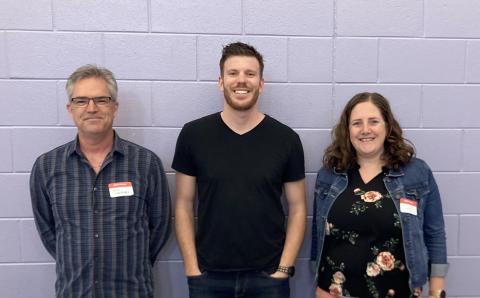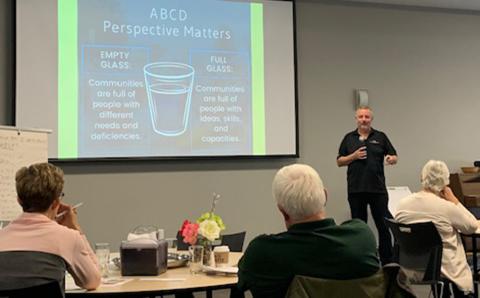Brady is missing teeth from doing crystal meth. He has scars up his arms from street fights and from cutting himself. He started doing drugs at 14. By his early 20s he was living in a flophouse, selling drugs, and stealing stuff in the neighborhood—bikes, tools, and electronics. It was all to gain more respect and fund his drug addiction. He spent eight years of his life gaining respect on the street.
I first met Brady at his lowest point. The first time we talked, he was swaying back and forth, staring off into the distance in a drug-induced stupor. In the weeks that followed, our faith community introduced Brady to a local doctor who connected him to a harm reduction program. Then we helped Brady move into an addiction recovery home.
Brady started attending our gatherings on Sunday evenings at The Table, the church plant I pastor, to join others around a meal, prayer, and God’s Word.
Through new friendships with people at The Table, Brady encountered Jesus.
What did it look like for Brady to leave everything and follow Jesus?
Learning to follow Jesus meant giving up eight years of living as a hardened street criminal.
Sure, it began by finding amazing relief and peace in and through Jesus and incrementally discovering new things about life in relationship with God and a Christian community. Yet while he shifted from life on the street to new, healthy patterns, he quickly realized it was going to take a lifetime.
“Almost every day of the last eight years was focused on getting credibility on the street,” Brady said. “Becoming a Christian meant slowly giving up everything that I had worked for.”
I think we all have something we’re personally moving toward, our own personal goals and pursuits—until we meet Jesus.
There is a story in the Bible of another man who had his own pursuits upended by Jesus.
When Jesus was starting his earthly ministry, he was looking for a handful of people to join his mission. As Jesus walked along, he saw Levi, son of Alphaeus, sitting at the tax collector's booth. “Follow me,” Jesus told him, and Levi got up and followed him.
We might assume that Levi was an important person in the region of Galilee. But that was not the case. Levi was a Jew in a Jewish culture, so there's nothing surprising about that. But as a tax collector, he was despised and considered a worthless thug.
Tax collectors such as Levi would often sit at a booth on a busy street corner and charge people taxes on their wages, their land, and their beasts of burden such as donkeys or horses—not to mention the taxes per axle on carts or wagons.
Often these tax collectors would extort money out of their fellow community members by force. Using the services of gangsters to threaten and beat money out of people was not unusual, meaning Levi might have been one of the most hated and despised people in all of Galilee.
However, despite the wider community's dislike, Levi probably gained social status with other "worthless thugs" or other sinners. We see that when Jesus visits Levi's house, the guests include other "tax collectors and sinners" (Mark 2:15-16).
Levi, like Brady, might have worked his whole life gaining street credibility and position, and he likely made some serious cash in his line of work. Even so, when Jesus calls him this day, Levi surprisingly gets up without hesitation and follows Jesus. Levi doesn’t just leave his profitable tax booth. He leaves all his social status.
A Change of Heart
When I was in my late teens, my dream was to get rich and have all the things that often come with wealth. At 19, I left the church. I started a job in the trades and made six figures a year. At 20, I bought my first house and filled it with all the stuff I dreamed of: new furniture, an entertainment center, and electronics. In the garage was a brand-new truck, a four-wheeler, a bike, and more.
Along with the wealth came new social circles, including friends who shared the same lifestyle.
In my late 20s, that trajectory changed when I was in a car crash. My physical injuries kept me in bed for more than a week. In that low place, I began praying to the God I had learned about as a boy. In that season, I became a follower of Jesus.
When I became a follower of Jesus, many of my priorities slowly changed.
I felt God giving me a heart for others, particularly those living in poverty. When I was healthy enough, I found myself driving to a nearby city to meet with homeless people. I had absolutely no idea why I began doing this. In hindsight, I see it was the Holy Spirit animating me toward new kingdom-shaped priorities. It had to be the Spirit, because until that point my priorities came out of my self-absorption.
Beginning to follow Jesus led me to something better than what I had imagined for myself.
Today, at 40 years old, I serve with my wife, Karen, as church planters in an under-resourced urban context. I’m continuing to learn that giving up everything to follow Jesus includes a gentle pull toward the uncomfortable.
Not a Cheap Jesus
John 6 includes a story in which a huge group of people were following Jesus. It was a loosely organized group truly interested in Jesus’ life and teaching. Each person had made a real sacrifice to follow him; they had given up their evenings to listen to him and carved time away from their work to see his miracles. It seemed they really liked this guy Jesus. In fact, John 6 says this group wanted to follow Jesus so desperately that when they found out that Jesus had taken a little boat trip across a lake, they hustled around the shoreline on foot to catch up with him the next morning.
When they caught up, Jesus invited them to sit, and he began to teach them.
As gulls soared quietly overhead and waves gently lapped the beach, a hush moved over the crowd. Jesus looked at the group and in essence said, “Everyone who follows me and believes in me shall have eternal life.”
For all their enthusiasm about Jesus, you would expect the crowd hearing these words to get excited, to declare to Jesus, “We want to follow you! We want this salvation and eternal life!”
Except that isn’t what happens.
When Jesus declares that following him and placing one’s faith in him is the only way to the Father and abundant life, the people are shocked. They start to grumble and fume. John 6:60 tells us, “On hearing (these words), many of his disciples said, ‘This is a hard teaching. Who can accept it?’” Aware that this gang of followers is grumbling, Jesus asks them, “Does this offend you? … This is why I told you that no one can come to me unless the Father has enabled them” (John 6:61, 65). With love, Jesus says, “Follow me. Put your life in my hands. I am the way of life. I am the way to the Father.” Yet when he says this, his followers throw up their hands and split. John 6:66 says, “From this time many of his disciples turned back and no longer followed him.” This huge group of people had sacrificed so much to follow Jesus, but now they just say “Forget it” and take off.
Why does this happen? Perhaps the fuming crowd walked away because they wanted to have eternal life but still hold on to their own lives. Maybe they wanted to keep their sin and receive God’s forgiveness. Maybe they wanted a relationship with God without his Son. They were willing to make a small sacrifice, but not a complete sacrifice. They wanted salvation without faith.
In short, they wanted the cheap Jesus. They only wanted to follow Jesus halfheartedly. Sure, they had made sacrifices, but they didn’t want to bet their entire lives on Jesus. They could run from here to there with Jesus and handle getting tired as they followed him, but they couldn’t handle actually placing their lives in his hands. That would require taking the risk of faith.
When the crowd took off and the dust settled, Jesus turned around and saw only a small huddle of people staring at him. Jesus said to them, “Aren’t you going to take off too?” A guy by the name of Peter, one of Jesus’s disciples, piped up: “Lord, to whom shall we go? You have the words of eternal life. We have come to believe and to know that you are the Holy One of God” (John 6:68). Peter laid everything on the line. He said, “I’m all in. I put my faith in you alone. I follow you!”
Peter made a clear declaration of what it means to give up everything to follow Jesus: “We have come to believe and know that you are the Holy One of God.” That’s some serious trust in what Jesus says.
According to theologian John Piper, Peter is saying that “wherever we look for another Lord, another way, another friend, another philosophy, another view of God, another salvation, another meaning, they all come up short. We can’t walk away. You have the words of life.”
So we follow you, Peter says. Even if it means giving up everything.
What Does It Look Like?
For me, following Jesus has recently included things such as going for coffee with a neighbor even though I might rather be doing something else. It has included giving up sleep and space in our home to someone sleeping rough. It has meant just smiling while I watch neighbor kids tear up the newly seeded lawn. It has included our family living with less. It has meant volunteering in an inner-city school, a job that often comes with more pain than joy.
For a young single man in our community, following Jesus has meant giving up boiling anger and the desire to push people away. Since birth he’s been in and out of foster care. He continues to struggle with the pain and anxiety of separation—not having parents who cared for him the way he always hoped, not having a dad around to spend time with him.
“After my experience with coming to Christ and joining a missional community (The Table),” he said, “I started to show up at their gatherings regularly. The more I went, the more free and peaceful I felt.” For him, following Jesus into Christian community has become an amazing source of peace amid constant feelings of separation and anxiety. This young man continually gives up his desire to be alone and detach from others so he can be in and with Christian community.
I recently asked urban ministry practitioner Samantha Brinkman what it meant for her to give up everything to follow Jesus. She responded, “I can trust that wherever God is leading me is far better than wherever I can go on my own.” These words ring true for the young man I mentioned, for Levi, for Peter, for Brady, and for me. Yes, leaving our stuff behind can be painful. But there’s always something better on the other side.
“It's not just leaving your home to follow Jesus into the wilderness,” Brinkman added. “It's leaving the burdens of a sinful world to walk beside still waters and lie in green pastures.”
Brinkman’s words remind us that leaving behind our personal desires to follow Jesus’ desires instead always comes with amazing benefits.
Today Brady is still struggling with the slow leak of his ego and losing street cred. He's still learning new life rhythms beyond crime and addiction.
A young man continues to struggle with detachment issues and a longing to be alone.
I still struggle with what it means to give up more conveniences and comfort as our family does ministry in an under-resourced urban context where many people struggle daily to afford food, survive on disability support programs or part-time minimum wage income amid an increasingly expensive rental market.
In the midst of the struggles, Jesus invites us deeper into something better, something we don’t fully understand. Yet we follow Jesus.
Discussion Questions
- What have you left behind, such as personal goals or pursuits, in order to follow Jesus?
- What do you think should be the priorities in the life of a Christ-follower?
- The author talks about wanting a “cheap Jesus”—one that demands small sacrifices from us but not huge sacrifices. Have you struggled with this desire for a cheap Jesus in your life? If yes, how? If not, how have you kept it at bay?
- What are some of the amazing benefits you can think of from following Jesus?
About the Author
Terence Schilstra is the pastor/planter at The Table, a Christian Reformed church plant in downtown Thorold, Ont., and author of Peace of the City; A Handbook for Missional Communities.









